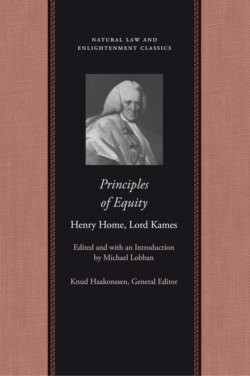Читать книгу Principles of Equity - Henry Home Lord Kames - Страница 13
На сайте Литреса книга снята с продажи.
Оглавление[print edition page 5]
PREFACE to the Second Edition
An author who exerts his talents and industry upon a new subject, without hope of assistance from others, is too apt to flatter himself; because he finds no other work of the kind to humble him by comparison. The attempt to digest equity into a regular system, was not only new, but difficult; and for these reasons, the author hopes he may be excused for not discovering more early several imperfections in the first edition of this book. These imperfections he the more regretted, because they concerned chiefly the arrangement, in which every mistake must be attended with some degree of obscurity. No labour has been spared to improve the present edition: and yet, after all his endeavours, the author dare not hope that every imperfection is cured: that the arrangement is considerably improved, is all that with assurance he can take upon him to say.
For an interim gratification of the reader’s curiosity before entering upon the work, a few particulars shall here be mentioned. The defects of common law seemed to the author so distinct from its excesses, that he thought it proper to handle these articles separately. But almost as soon as the printing was finished, the author observed that he had been obliged to handle the same subject in different parts of the book, or at least to refer from one part to another; which he holds to be an infallible mark of an unskilful distribution. This led him to reflect, that these defects and excesses proceed both of them equally from the very constitution of a court of common law, too limited in its power of doing justice; whence it appeared evident that they ought to be handled promiscuously as so many examples of imperfection in common law, which ought to be supplied by a court of equity. This is so evident, that even in the same case we find common law sometimes defective, sometimes excessive, according to occasional or accidental circumstances, without any fundamental difference. For example,
[print edition page 6]
many claims, good at common law, are reprobated in equity because of some incidental wrong that comes not under the cognisance of common law. A claim of this kind must be sustained by a court of common law, which cannot regard the incidental wrong; and in such instances common law is excessive, by transgressing the bounds of justice. On the other hand, where a claim for reparation is brought by the person who suffered the wrong, a court of common law can give no redress; and in such instances common law is defective. And yet the ratio decidendi1 is precisely the same in both cases, namely, the limited power of a court of common law.
The transgression of a deed or covenant is a wrong that ought to be distinguished from a wrong that misleads a man to make a covenant or to grant a deed. The former only belongs to the chapter Of Covenants; the latter, to the chapter Of the powers of a court of equity to protect individuals from injuries. For example, a man is fraudulently induced to enter into a contract: the reparation of this wrong, which is antecedent to the contract, cannot arise from the contract; and for that reason it is put under the chapter last mentioned.
